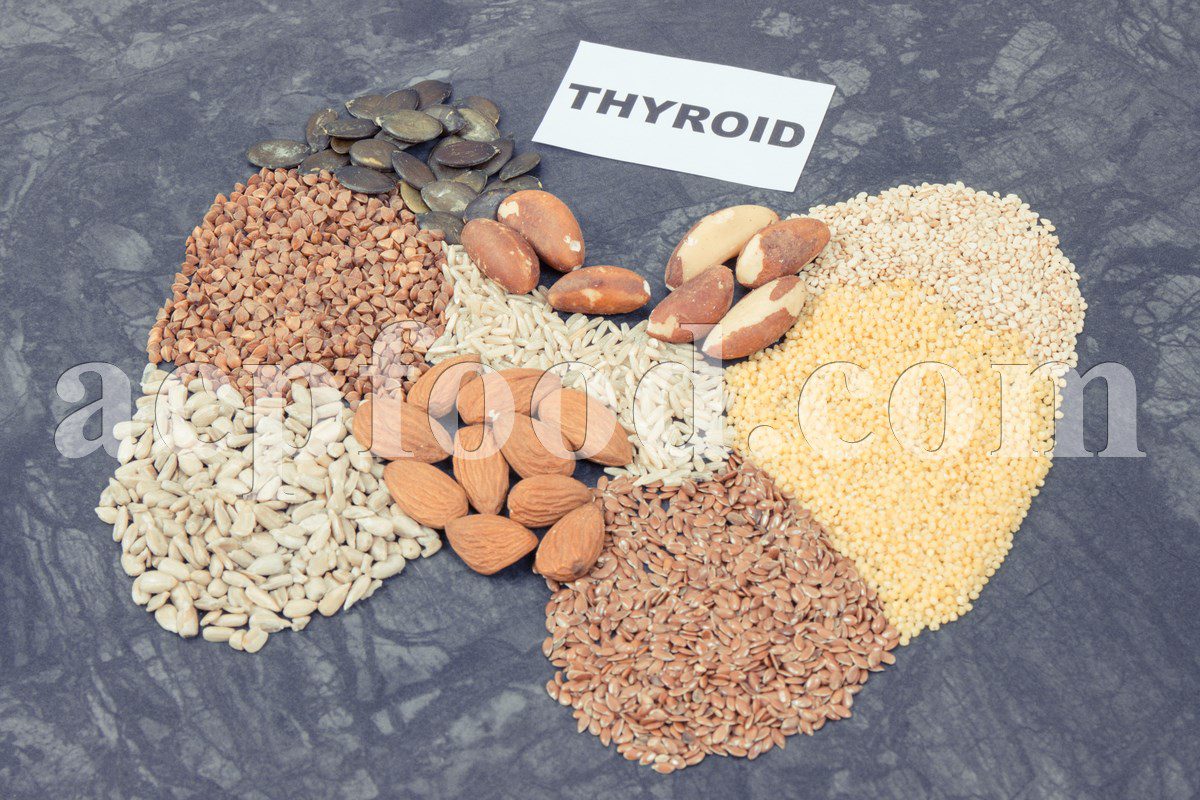
The thyroid is a butterfly-shaped gland in the front of the neck, below the larynx and above the collarbones. It plays a role in the regulation of the body’s metabolism (processes of energy use and storage) by releasing thyroid hormones (two hormones T3 and T4 means triiodothyronine and thyroxine). In this article we are going to explain hypothyroidism, its causes, symptoms and treatment from traditional Iranian medicine point of view of.
Table of Contents
What Is the Thyroid and What Is Its Role in the Body?
There is a very precise mechanism for producing thyroid hormones and getting them into the bloodstream. The pituitary gland can estimate the level of these hormones in the bloodstream.
When these hormones (T3 and T4) have a low level, the pituitary gland activates a stimulating hormone called TSH to produce T3 and T4, and when this gland has more secretion, the pituitary gland stops the secretion of TSH to prevent this function.
Also read it: Suitable Diet For Diabetic Patients
Sometimes the thyroid is disturbed and the body’s immune system attacks the thyroid cells, which causes this gland to overwork and underwork.
If thyroid gland produces too much T3 and T4, the person will suffer from hyperthyroidism (low TSH), and if the production of theses hormones decreases too much, the body’s metabolism will slow down and the person will suffer from hypothyroidism (high TSH).
Thyroid disease is usually an autoimmune disease, it is generally hereditary and runs in many members of a family.
The prevalence of thyroid disease is higher in women than in men and in the elderly than in young people.
Symptoms of hypothyroidism sometimes are observed in people with type 1 diabetes who have poor control over their disease.
Definition of HypothyroidismIn the most common type of hypothyroidism, which affects 1% of the population, especially elderly women, the thyroid gland becomes small and crumpled, and its cells are destroyed due to a defect in the patient’s immune system. In some cases, with less prevalence, immune system disorders not only cause hypothyroidism, but also cause thyroid enlargement and goiter. Both types of hypothyroidism are seen with other autoimmune diseases that will be mentioned later. Although having hypothyroidism makes you prone to autoimmune diseases compared to other healthy people in the society, the probability of you getting these diseases is still very low. One of the reasons why a person suffers from hypothyroidism is the treatment of “Graves” disease through surgery or treatment with radioactive iodine. |
 |
Hypothyroidism Causes
In traditional Iranian medicine, the term “hypothyroidism” is not mentioned directly, and based on the review of evidence and information, this disease, like other diseases such as Polycystic Ovary Syndrome, laziness and frailty, excessive sleep, memory weakness and etc, is caused by an increase in the coldness of the body (increase in phlegm and black bile) and especially phlegm (coldness and moisture).
So, we should know that the unhealthy life style and diet and excessive consumption of cold and moist and cold and dry foods, too much sleep, inactivity, overeating, and cold wind are important and influencing factors on occurrence or intensification of hypothyroidism.
Modifying nutrition, exercising, massage with oil and cupping the area under the throat are suitable for those suffering from this disease.
Also read it: Phlegmatic Temperament
Hypothyroidism is not a problem that develops overnight, but develops slowly over several months, and you or your family may not realize its symptoms at first, or you may attribute these symptoms to aging. Today, with the presence of well-equipped laboratories, it is very easy to perform thyroid function tests and diagnose hypothyroidism in its early stages.
Advanced hypothyroidism is sometimes called “Myxedema”. The development of all signs and symptoms related to hypothyroidism mentioned here will not be seen in all patients unless hypothyroidism has been occurring for several years and treatment has not been done. You may first see a doctor because of fatigue or weight gain, although these symptoms can occur for other reasons as well.
 |
Hypothyroidism Signs and SymptomsThe symptoms of hypothyroidism, which include signs in skin, eye, respiratory, heart, cardiovascular, digestive system, are among the symptoms of coldness, especially coldness and moisture on the body. Not all symptoms can be seen in all patients. This disease slows down chemical reactions in the body and causes the following signs and symptoms:
Most patients with hypothyroidism gain 5 to 10 kg of excess weight, these people’s appetite does not increase and may even decrease. |
-
Sensitivity to cold
Hypothyroid patients are very sensitive to cold weather and like to wear several warm clothes and sit next to the heater. These people feel that when they want to move quickly, their muscles become stiff and cramp, especially when it is cold.
Also read it: What Is Melancholic Temperament?
-
Psychological problems
You may feel tired and sleepy and mentally sluggish. Your reactions become slower. Doctors may misdiagnose dementia in older patients. Also, anger and extreme aggression are symptoms of this disease.
-
Faltering
Your voice may be tired and hoarse and you may falter.
-
Heart problems and decreased heart rate and blood pressure changes
Unlike patients with hyperthyroidism, your pulse may slow down to around 60 beats per minute. You may also have high blood pressure. An elderly patient who has had severe hypothyroidism for a long time is at risk of heart failure. Heart angina can be the first symptom of hypothyroidism.
-
Constipation
As all the body’s activities slowdown in hypothyroidism, in terms of weakening the digestive system, you may also suffer from constipation.
-
Heavy menstruation
Your periods may become very heavy and severe.
-
Skin and hair problems
Your skin is likely to become dry and rough and flakes easily, pale skin, and swollen eyelids, hands, and feet. Some patients may notice that their skin color has changed to lemon yellow and the blood vessels in the cheeks have turned purple. The hair becomes dry and brittle, and the outer edges of the eyebrows may fall out.
-
Nervous system disorders
You may have some hearing loss and problems with your balance. If your fingers start to burn and tingle, especially at night, you can relieve it by shaking your hands vigorously.
Also read it: Constipation in Traditional Iranian Medicine
-
Fatigue and depression
-
Swelling of the face
-
Infertility and cold temper
-
Forgetfulness and irritability
-
Anemia
-
Decreased body metabolism
-
Reduction of sweating and pale lips
Diseases that Occur along with HypothyroidismAlthough the risk of these diseases is low in people with hypothyroidism, these people are more sensitive to these autoimmune diseases than other healthy people.
|
 |
 |
Treatment of Hypothyroidism in Traditional Iranian MedicineThe treatment of hypothyroidism requires following specific points and rules continuously. Foods that are useful for hypothyroidism in traditional medicine are hot temperament foods, and it is better to avoid using cold temperament foods to treat hypothyroidism in traditional medicine. This must be done carefully. To regulate and treat hypothyroidism, it is recommended to do the following items: |
1- Correct your temperament and avoid cold foods
Since this disease is caused by a phlegmatic-melancholic temperament, first of all, you should reduce the consumption of cold foods to the lowest possible level, so:
Avoid cold and moist foods such as yogurt, milk, fish, cucumber, etc.
Avoid consuming cold fruits and cold water, especially drinking cold water along with food, immediately after meal, at night and in the morning on an empty stomach.
Never consume tomato and cucumber salad or pickles with food.
Do not use supermarket oils and packaged foods with preservatives.
Use natural olive oil in food.
Use thyme and dill with food.
Avoid eating cheese at breakfast.
Try to eat hot temperament foods or jams which are made with honey for breakfast.
Eat chicken and fish with warm spices like ginger, cardamom, cloves, and cinnamon (but don’t overeat it and don’t use spices all the time in all your meals).
Also read it: Foods Temperament
Avoid consuming foods containing caffeine, carbohydrates, sugar and flour, canned foods, sweets and fast foods.
Do not consume vegetables such as broccoli and spinach, and if you have to eat them, cook it first.
Avoid cold temperament foods, especially for dinner.
Cook rice with dill, cumin or saffron.
Use hot temperament foods.
2- Observe eating habits
Chew your food well and reduce the amount of your food as much as possible.
Avoid excessive consumption of heavy and thick foods such as pasta and noodles, lasagna and pizza cheese.
Avoid eating foods in short intervals and having several snacks between your meals.
Avoid overeating, especially starchy foods.
After having your meal, walk a little at home.
Do not sleep immediately after eating food.
3- having enough movement and avoid gaining weight.
4- Treat digestive problems and constipation.
5- Sleep well from 11 pm to 7 am.
6- Use general home remedies
- Massage under your throat daily for ten minutes with chamomile oil for four weeks. Treatment of hypothyroidism with massage must be done for more than 4 weeks and under the supervision of a doctor.
- When you want to drink water, mix warm water with honey. You can consume 2 tea spoons of honey during a day.
- Combine water, a little salt, peppermint hydrosol, rose water, a few drops of vinegar, sumac and some honey and gargle it and then throw it away.
- Use Persian Ziziphora (Ziziphora tenuior L.) or saffron or peppermint and cinnamon and a little ginger. It should be consumed at least 1 hour after meal, one to two cups a day. (Don’t use them always and continuously).
- Use foods containing B and E vitamins.
- Use iodized salt before and after meals (the tip of a teaspoon is equal to one gram).
- Use leeks in your foods, since it contains Iodine.
- Using wheat germ in salads, or using wheat germ powder in yogurt as a snack, or adding a tablespoon of this powder to stews and meals.
- Doing warm cupping under your throat (should only be done under the supervision of a doctor because it can be dangerous).
- Smelling warm perfumes during sleep such as jasmine, Polianthes tuberosa and Narcissus flower.
If you have hypothyroidism avoid the following items:General precautions that should be avoided for hypothyroidism according to traditional Iranian medicine experts: – Drinking liquids along with and immediately after meals – Eating several types of food in one meal – Eating fruit immediately before and after meals – Drinking water immediately after fruit – Eating fruit in the morning on an empty stomach – Eating cold milk in the morning on an empty stomach |
 |
– Eating fruit which doesn’t belong to the current season
– Drinking very cold milk or water
– Sleep during the day
– Sleeping on prone position
– Bathing, exercising and intercourse with a full stomach
– Consuming foods which were cooked days before
– high consumption of soy, broccoli, cauliflower, sometimes lettuce, turnips, peanuts, and sweet potatoes
– Excessive consumption of fruits such as peaches and pears
Should We Stop Using Levothyroxine Tablets When We Are Doing Above Treatments?
Levothyroxine should be reduced step by step and then cut off under the supervision of a traditional medicine specialist and after correcting the temperament and providing the necessary alternatives by the doctor and following the correct lifestyle and nutritional principles. Therefore, never stop taking these pills unknowingly and with the advice of others. Because stop taking it at once will have more side effects than using it.
References:
-Daeratol Maarif Giah Darmanie Iran (Noskhehaye Shafabakhsh), by Haji Sharifi, Ahmad (Attare Esfahani)
-Traditional Iranian Medicine Doctor’s Prescriptions.
